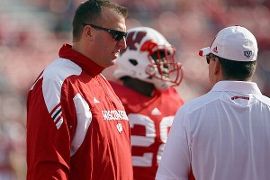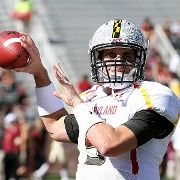|
The Big Ten witnessed an unprecedented 40 coaching changes this past offseason, including massive staff makeovers at Penn State, Ohio State, Illinois and
Wisconsin?  Exoduses were expected at the first three programs, which all had head-coaching changes and, in both State College and Columbus, the stench of scandal still in the air. Penn State, Ohio State and Illinois made up 60 percent of the Big Ten's coaching turnover. The surprise: Wisconsin accounted for another 15 percent. It didn't add up. Wisconsin has won the previous two Big Ten titles and reached the previous two Rose Bowls. The Badgers have 32 wins since 2009. They've produced 11 NFL draft picks the past two years. Their head coach, Bret Bielema, is firmly entrenched, having won 60 games in his first six seasons under the watchful eye of his predecessor, athletic director Barry Alvarez. They return star running back Montee Ball, a 2011 Heisman Trophy finalist who rushed for an NCAA-record 39 touchdowns. Yet one by one, Bielema's aides started leaving Mad City. Between Dec. 22 and Jan. 19, Wisconsin lost six assistant coaches: Paul Chryst, Bob Bostad, Dave Huxtable, Joe Rudolph, DelVaughn Alexander and DeMontie Cross. Pitt hired Chryst as its head coach, and he took three Badgers assistants -- Bostad, Huxtable and Rudolph -- with him. Such a migration almost always follows a head-coaching change, but Bielema had his five-year rollover contract picked up in late January, locking him up through the 2016 season. Is Wisconsin's situation unusual? No doubt. Does it present challenges? Absolutely. Are Bielema and his players worried? Not a chance. Wisconsin is all about hard-charging running backs, titanic linemen, power offense, player development, the Jump Around and the Fifth Quarter. After the 2012 season, the Badgers hope they'll also be known for mastering transition. "That's what we do at Wisconsin," senior linebacker Mike Taylor said. "We have good years, we have good coaches that come in and eventually will move on to bigger and better things. And we'll get new coaches who will do the same thing. I don't think it's a problem or that much of a hitch. It's not really much of a worry." Bielema is quick to point out he lost three assistants after the 2010 season, including defensive coordinator Dave Doeren, and the team still went back to the Rose Bowl. As a young coach who skyrocketed up the ranks, Bielema looks
for assistants with similar ambition. If they want to hang around Madison forever, he probably won't hire them.  "I've had transition," Bielema said, "and it's something that I've really embraced." Still, six is a substantial number, and this winter Bielema dug up his notes from 2006, when he had to oversee an entire staff for the first time. They showed that the best environment is one where each coach has ideas and opinions, and the freedom to express them -- "a democracy more than a dictatorship," Bielema said. Although Bielema has final say on key decisions, such as whether or not to recruit current Penn State players following the NCAA sanctions, he wants to hear different viewpoints. The directive for Wisconsin's six new assistants -- offensive coordinator Matt Canada, offensive line coach Mike Markuson, linebackers coach Andy Buh, tight ends coach Eddie Faulkner, wide receivers coach Zach Azzanni and secondary coach Ben Strickland -- could be as simple as, don't screw up a good thing. But it's more than that. "Change always involves discomfort; change always involves risk because it's unknown," Azzanni said. "The new coaches, we really, really respect what's been done here. We understand the coaches who came before us did one hell of a job, and are probably why we're here. Our kids know we respect what they've done in the past, how they've been coached, but we're also going to be ourselves. As far as everyone patting you on the back and saying we've had great years, that's great, but personally, I haven't done anything here. "As new coaches, we all have an edge to prove ourselves and not let this thing go backward." The spring provided a chance for the new assistants and their players to acclimate to one another. Each coach used different tactics. Buh, for example, broke the ice with humor, like playing hip-hop music as players entered the room for a special-teams meeting. "He'd bob his head and act like he's a rapper," Taylor recalled. "Guys were smiling and laughing." But it wasn't all fun and games. This spring, Taylor missed a class. While he had an excuse for his absence, he didn't relay it to Buh. Consequently, Buh summoned his All-Big Ten linebacker to the football complex the next day at 5:30 a.m. "I'm not going to argue," Taylor said. "He's your coach, and just because he's new, he's still the authority." Bielema, for the most part, let his assistants do their thing, although he still monitored them, Big Brother style. "I put a camera in the back of the room and watch them teach a class," Bielema said. "I'm not in there, but I want the camera to capture what they're doing. There's some stuff that made me feel good." Bielema is most encouraged by the new elements being added to the program, whether it's Canada offering up schematic ideas, Azzanni brainstorming recruiting strategies or Faulkner producing unsolicited projects on leadership and professional development. Faulkner, a former Wisconsin running back, has done similar summer projects at previous coaching stops. This summer, he read Sun Tzu's "The Art of War" -- a favorite among coaches -- and came up with a new theme, the art of competition, for the Badger tight ends. Faulkner also saw the movie "Moneyball" and tried to apply it to Wisconsin's situation -- and not just as a nickname for Montee Ball. "When they're transitioning and going a different way about how they want to pursue free agents and stuff, it's relative to the kind of transition we have here," Faulkner said. "The brand is Wisconsin. It's us buying in and making sure we're buying in. It's more about coaches and making sure the organization is on the same page and doing all we can to be successful." The coaching staff remodel is only part of the transition Wisconsin faces for the 2012 season. For the second straight year, the Badgers are replacing a decorated starting quarterback. And for the second straight year, they've brought in a graduate transfer from the ACC.  Danny O'Brien arrived in Madison in early June after graduating from Maryland, where he spent the past two seasons as the starting quarterback. Almost exactly a year earlier, Russell Wilson joined the Badgers following a decorated career at NC State. Wilson's migration couldn't have
worked out much better: He set an NCAA single-season record for pass efficiency (191.8) and led Wisconsin to the Rose Bowl. Bielema attributes the transfer trend to a wave of injuries at quarterback and brushes off claims that Wisconsin can't develop its own players. Still, the Badgers' offense once again might be led by an outsider. "Coach Bielema wouldn't have brought [O'Brien] in if he wasn't a good fit," senior offensive tackle Ricky Wagner said. "Just like Russell, after a couple weeks, it seems like he's been here for years.
When you bring in great guys like Danny and Russell, it's not very hard to accept them." Why is Wisconsin so comfortable with all the new faces in the program? For starters, the Badgers don't have an identity crisis. They lost one of the nation's top playcallers in Chryst, but the offensive structure isn't changing. They lost one of the nation's top line coaches in Bostad, but they're still expected to have multiple linemen in the mix for national honors. "The brand of football we play," Faulkner said, "is not going to change." Wisconsin has had tremendous stability at the top -- two head coaches since 1990, both of whom are still with the program. Plenty of assistants have left, but the wins keep coming. "Coaching's overrated at times," Azzanni said. "If you're saying it's all about coaching, then you're saying our players aren't very good. That's how I approach it with our wideouts. If your offensive coaching is so great and now there's new coaches and we're going to be awful, then that means you guys aren't very good either. It's about players.
Coach Bielema and Coach Alvarez have built a machine here. "We just plug in the right people, the right fits and keep on the same path." Bielema is confident Wisconsin won't veer off track, although the ultimate proof won't come until game day. As part of preparing the new assistants and the players to work together in the Saturday spotlight, Bielema held a meeting entitled: "Tell me what I need to hear, not what I want to hear." "When you're 19 years old and it's third-and-6 and the quarterback got sacked and you think you might have been the guy who didn't pick up the guy you're supposed to pick up, sometimes [players] tell you something that's completely opposite of what the truth is, just to not be berated on the sidelines," Bielema said. "I always tell our coaches, 'I want more coaching Monday through Friday than Saturday.'
Saturday is not the day to blow somebody up. "Saturday's about managing the game and making sure we have success going forward." If Bielema achieves his goal, no one will be talking about six new assistant coaches. They'll be talking about three straight Big Ten championships.
|

